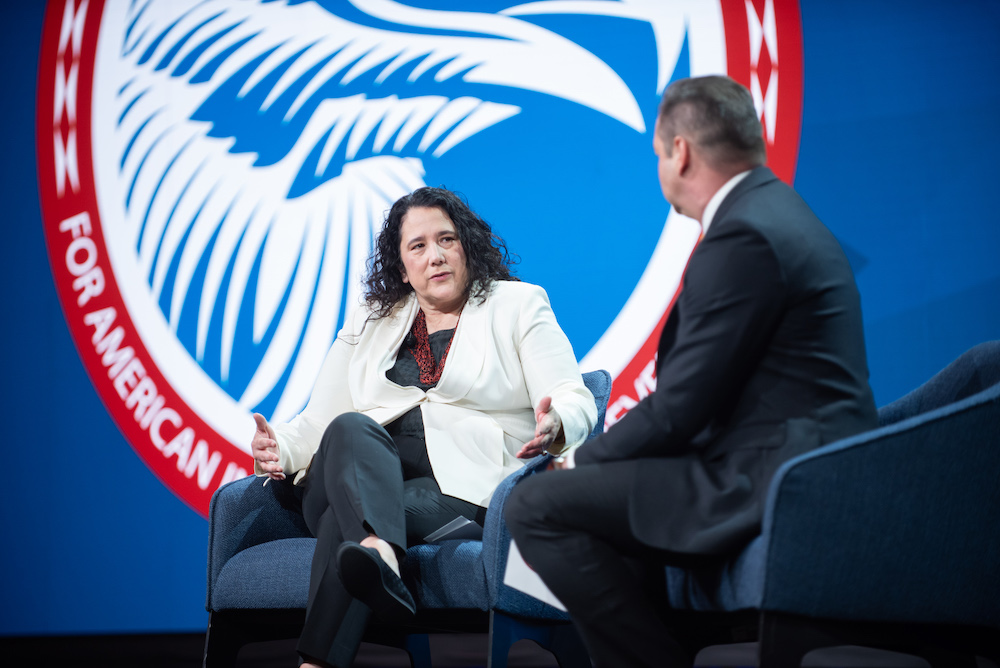
- Details
- By Brian Edwards
- Economic Development
The Small Business Administration has moved beyond just writing loans to Native entrepreneurs, fundamentally reshaping how the agency engages with Indian Country through deeper institutional partnerships and expanded programs, SBA Administrator Isabel Casillas Guzman told Tribal Business News last week.
"We've really taken that approach of needing to reform our programs dramatically in order to get back to our core mission of filling gaps in the capital markets," Guzman said during an interview on Friday, Nov. 15.
Speaking 10 days after former President Donald Trump's election victory, Guzman outlined her concerns about preserving the agency's transformation over the past three years. Under her leadership since March 2021, the SBA has increased Native lending by 89%, reaching $267 million in the last fiscal year. The number of Native banks and Community Development Financial Institutions working with SBA has grown by 30% to 13 institutions.
The agency has also launched several new initiatives aimed at building long-term capacity in Indian Country. These include a tribal college grant program to enhance entrepreneurship education, an updated tribal consultation policy that has directly influenced program outcomes, and a new Native Trade Export Program designed to help Native businesses access international markets.
"We've tried to solve for that by going through the very networks that would understand those unique challenges and could work with them by expanding our Native bank and CDFIs," Guzman said.
As President-elect Trump prepares to take office in January, Guzman sees both progress and potential vulnerability in SBA's tribal initiatives. While many reforms of the past three years are now institutionalized, she emphasized that "leadership at the top is really critical to ensuring that agencies and contracting officers continue to drive forward towards expanding contract opportunities."
The concerns about continuity come after significant gains: Native-owned businesses, including Alaska Native Corporations and Native Hawaiian Organizations, secured $23.3 billion in federal contracts in fiscal year 2023 — an $8 billion increase from fiscal year 2020, according to Guzman. That figure represents a 49 percent jump, driven by new contracting reforms and investments in technology to streamline SBA’s certification processes.
The gains represent progress towards the Biden administration's goal of increasing small disadvantaged business (SDB) contracting to 15% of all eligible federal contracting dollars by fiscal year 2025. "We've made huge gains, hitting over 12% in fiscal 2023 as we march toward that 15% goal," Guzman said.
The Office of Native American Affairs (ONAA) has played a central role in driving the SBA's expanded initiatives and gains in supporting Native entrepreneurship and tribal communities. Under the leadership of Jackson Brossy (Diné), ONAA has launched new programs addressing gaps in business development resources on tribal lands.
This office has garnered broad bipartisan support in Congress. Lawmakers from both parties have advanced legislation to codify ONAA into federal law, though the bill has currently stalled. The Native American Entrepreneurial Opportunity Act, introduced by Representatives Sharice Davids (D-Kan.) and Eli Crane (R-Ariz.), would expand the ONAA's staffing, funding, and authority to better serve Native entrepreneurs.
"This office is really important, because we're talking about nations and building strong relationships to lift up tribal communities who are facing extreme unemployment and poverty," Guzman said. "Entrepreneurship is the pathway towards building wealth and truly building up Native communities."
No SBA administrator has spent more time in Indian Country than Guzman, who has prioritized direct engagement with tribal communities. An early visit to Navajo Nation revealed to her firsthand the unique challenges Native entrepreneurs face, including logistical hurdles that force some businesses to maintain off-reservation locations just to manage e-commerce shipping. These visits helped her understand how Native entrepreneurs must operate "at such a higher efficiency to be able to manage those extra costs."
Her visits since have included the Winnebago Tribe, All Pueblo Council of Governors, Mashantucket Pequot Tribal Nation, and Chickasaw Nation, as well as Alaska Native communities in Anchorage, Nome, and Juneau.
The SBA’s work in Indian Country comes amid what the White House calls an unprecedented small business boom, with American entrepreneurs filing over 20 million new business applications during Biden's term — the most in any presidential term in history. Business ownership has doubled among Black households and hit a 30-year high for Hispanic households, while women own a higher share of businesses than before the pandemic.
"If we don't solve for the barriers and past historic challenges, our future is going to be tainted," she said.
Looking ahead, Guzman sees opportunities for further progress, particularly in expanding awareness of SBA resources through community navigator programs and strengthening networks that connect Native entrepreneurs to opportunities.
"Everyone can agree that the small businesses are not aware of everything the SBA does," she said. "If we don't solve for it by really partnering with the very organizations that have trusted relationships on the ground, that will continue to be a challenge."
